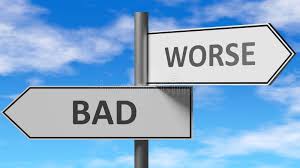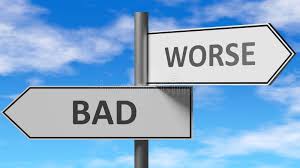
This was one of the first Portuguese phrases I learned because it was relatable. It literally means “It could be worse.” At first, I thought it was an optimistic phrase, but I quickly realised it was more nuanced and, often, bore a negative connotation in the Portuguese context. Although it is a universal coping mechanism, it hits home as part of the mental survival kit for most Nigerians, juggling the paradox of hope for a better future and the harsh reality of worsening circumstances. Podia ser pior could be a shield of resilience borne out of necessity or a subtle resignation to fate, blurring the line between complacency and contentment. What other options are there than to accept the bad while acknowledging the possibility of worse outcomes? I guess it depends on the situation. Are they modifiable? If so, then we should by all means actively strive to change them. But what can you do about a diagnosis of a terminal illness or losing a loved one? Well, these seem to be the worst outcomes in themselves, yet podia ser pior. What if you never received the diagnosis and died suddenly? Or what if you never had the loved one in your life in the first place or had no one to comfort you? What if they had a more tragic death than they did, or you had to kill them? The last scenario sounds improbable, doesn’t it? But it happens! These reflections, uncomfortable as they may be, can shift our focus, revealing the complexities and nuances even in the worst situations.
Not everyone holds positive views of the phrase Podia ser pior. A Portuguese writer has criticised it as illogical and even unethical because they claim it underestimates the pain and suffering one goes through, worse so when we tell other people. I understand their argument. To someone enduring immense hardship, hearing “it could be worse” might feel dismissive or insensitive. I think it is a phrase that might be better suited for self-reflection rather than offering comfort to others. On the flip side, perhaps it could remind us to keep a balanced perspective when we are suffering. Having an objective stance is something notoriously difficult when going through adversity. We are all prone to cognitive distortions during stressful times, such as selective abstraction, where we fixate on the negative aspects of a situation, amplifying our misery and fuelling our anxieties. These cognitive biases can make our struggles seem more insurmountable than they truly are. In these moments, reminding ourselves that “it could be worse” can help us break the cycle of negative thinking.
It’s now 2025, and with it comes the usual wave of optimism and anticipation for better things in the new year. Yet, deep down, we know that nothing really changes apart from the calendar dates. We live in the same homes, breathe the same air, wear the same clothes, and face the same problems as we had last year. Sure, many people would start a new diet in the new year, adopt healthier behaviours, take riskier decisions, and vow to do things radically differently, but ultimately, for most of us, our lives essentially remain the same. Every year, people send wishes for the “best year yet.” These wishes have been shared for decades, yet it’s hard to say that any year has truly been the “best” for anyone. Still, podia ser pior. No matter what happens in 2025, we may not always have control over our circumstances, but we do have control over how we respond. So here is to navigating the tension between hope, acceptance, and the realities we face.




